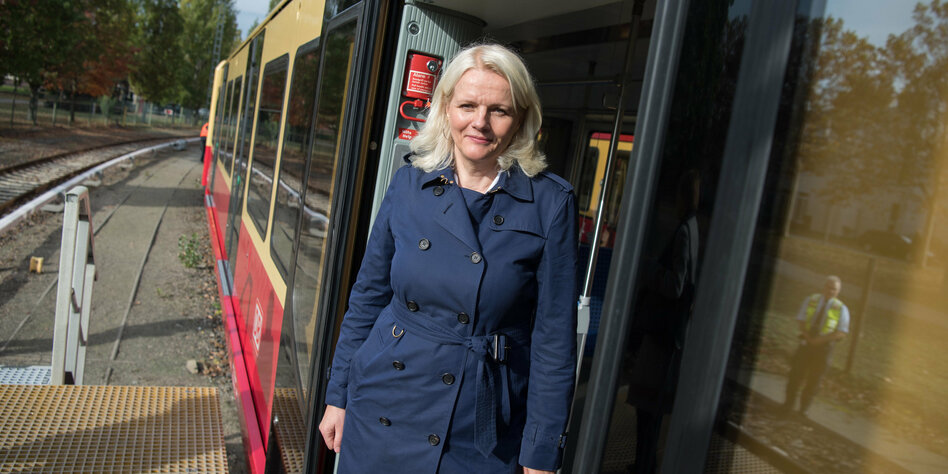Berlin’s S-Bahn is an impressive piece of infrastructure. The yellow and red trains travel over 203 miles (327 kilometers) of tracks that reach from the city center into the surrounding province. The S-Bahn transports almost 500 million riders per year, and together with the U-Bahn (the underground train system) it is a vital component of the public transport system in the German capital.
But during the Covid-19 pandemic, Berlin’s Transportation Senator (the local equivalent to a minister) has been attempting to privatize the S-Bahn. Senator Regina Günther is from the Green Party — a party that claims to defend the environment and the climate.
The single best thing a city government could do to reduce CO2 emissions is to make public transport free, financed by taxing the rich. This would encourage people to abandon their cars and take the S-Bahn or a bicycle. But the Green senator is doing exactly the opposite: prices for public transport in Berlin have consistently risen faster than the rate of inflation.
As decades of experience have shown, privatization is devastating for train systems. Private companies, attempting to maximize profit, inevitably cut service while raising prices. Multinational companies profit while transit workers and riders alike suffer.
The S-Bahn experienced a taste of privatization back in 2009. Its parent company, the state-owned German railway company Deutsche Bahn, was preparing for a public offering. To clean up their balance sheets, they drastically cut spending on maintaining Berlin’s local trains. By the winter of 2009, so many trains fell out of service that the whole system began to collapse. Only when the Deutsche Bahn abandoned its plans to go on the stock market was the S-Bahn put back into shape.
Berlin’s governing coalition is made up of the social democratic SPD, the Left Party (Die LINKE), and the Green Party — in German parlance, this is a “red-red-green” coalition. All three of these parties are formally committed to the fight against climate change, as well as to social justice. Yet they are planning to split the S-Bahn into three separate companies: one for the East-West lines, one for the North-South lines, and one for maintaining the trains. As workers attest, coordinating between three companies would cause endless chaos.
The Berlin government claims that there is no alternative to privatization — that their hand is being forced by EU regulations. But if any of these parties are in favor of a public transport system that is publicly owned, why are they not calling for mobilizations?
These mobilizations are already taking place against the supposedly “left-wing” government. S-Bahn workers are fighting alongside climate activists from Fridays for Future and other public sector workers to stop the privatization.
Unfortunately, Germany’s Green Party has a long history of making environmental promises and then delivering neoliberal policies. Just last year, they agreed to continue Germany’s lignite coal mining — the most carbon-intensive form of energy in the world — for several decades, until 2038! The Green Party prime minister of the state of Baden-Württemberg has just come out in favor of state subsidies for the purchase of new cars, including diesel-guzzling Mercedes.
And Die LINKE, which has a more left-wing profile, is certainly doing its best to manage the neoliberal state apparatus. But it has been part of the Berlin government for decades and has been responsible for privatizing 200,000 publicly-owned apartments, as well as hospital services and numerous other companies.
A serious fight against climate change cannot be expected from bourgeois governments, even “left-wing” ones. Working-class people in Berlin need an S-Bahn and a public transport system run democratically by workers and riders.











